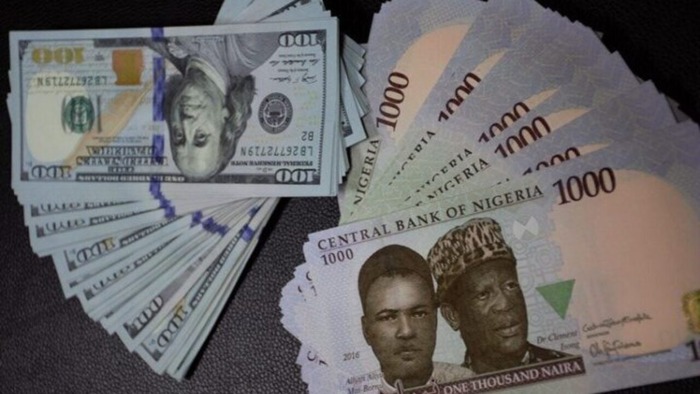The US Dollar on Wednesday crashed by 6.45 percent to N1,450 from N1,550 sold on Tuesday on the parallel market, commonly referred to as black market, after the Central Bank of Nigeria (CBN) hiked interest rate on Tuesday.
The CBN raised its Monetary Policy Rate (MPR), also known as its benchmark interest rate by 400 basis points to 22.75 percent on Tuesday from 18.75 percent in July 2023.

The Naira appreciated by 6.89 percent as the dollar crashed by 6.45 percent to N1,450 on Wednesday compared to N1,550 exchanged on Tuesday on the black market.
The impact of the rate hike has not yet reflected on the official foreign exchange (FX) as the naira depreciated by 2.04 percent after the dollar was quoted at N1,615.94 on Tuesday compared to N1,582.94 quoted on Monday at the Nigerian Autonomous Foreign Exchange Market (NAFEM), data from the FMDQ indicated.
During spot trading on Tuesday, the intraday high strengthened to N1,778 per dollar from N1,805/$1 on Monday. Also, the intraday low firmed marginally to N1,300 on Tuesday from N1,301 per dollar.
The daily FX market turnover declined by 7.45 percent to $154.16 million on Tuesday from $166.58 million recorded on Monday.
As of Wednesday, the Bureau De Change (BDC) operators have not yet received their dollar allocation from the CBN, BusinessDay findings show.
Although the reason is yet to be known, about 785 BDCs have been listed for the allocation, which the CBN approved of.
The CBN will sell $20,000 weekly to each BDC at a rate of N1,301/$, according to a circular published Tuesday. The BDCs are allowed to sell to end-users at a margin not more than one percent above the purchase rate from CBN
The Monetary Policy Committee (MPC) meeting, which held on Monday and Tuesday, raised the MPR by 400 basis points to 22.75 from 18.75 per cent., adjusted the asymmetric corridor around the MPR to +100/-700 from +100/-300 basis points, raised the Cash Reserve Ratio from 32.5 per cent to 45.0 per cent, and retain the Liquidity Ratio at 30 per cent.
Yemi Cardoso, governor of the CBN, who chaired the MPC said, “The MPC also deliberated extensively on various distortions in the foreign exchange market including the activities of speculators, putting upward pressure on the exchange rate with high pass-through to inflation.”
He said members were, however, convinced that the ongoing reforms in the foreign exchange market will yield the desired outcome in the short to medium term. Some of these reforms include: the unification of the foreign exchange market; promotion of a willing buyer willing seller market; removal of all limits on margins for the International Money Transfer Operator (IMTO) remittances; introduction of a two-way quote system and the broad reforms in the BDC segment of the market to restore stability, enhance transparency, boost supply, and promote price discovery in the Nigeria Autonomous Foreign Exchange Market.







